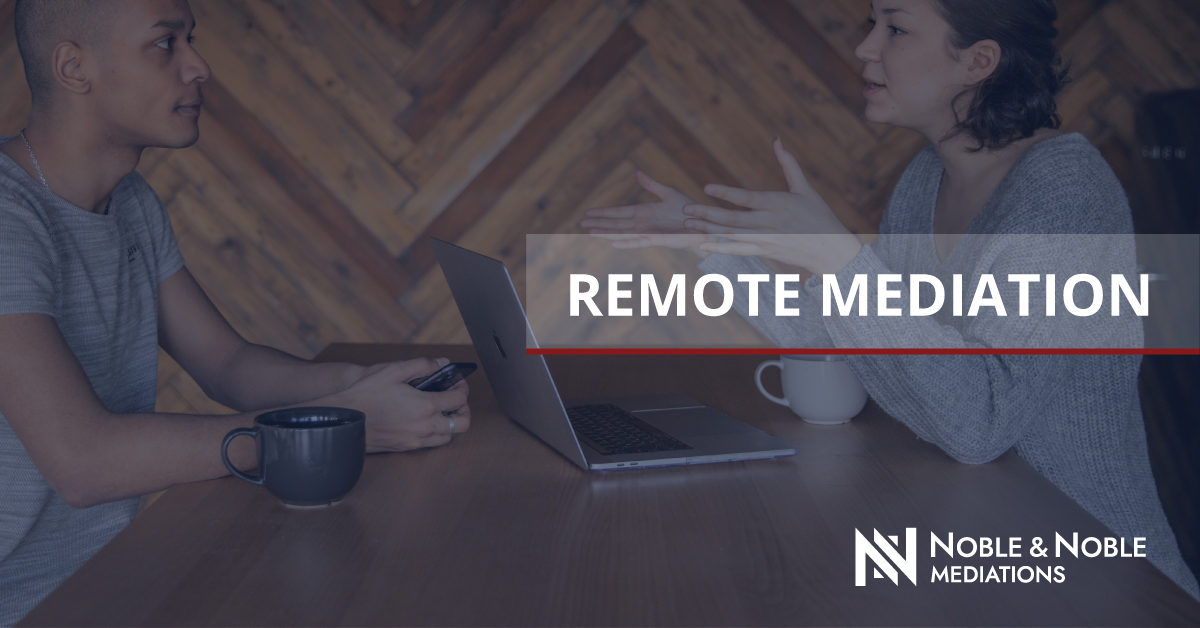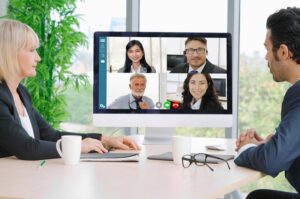Remote Mediation
Parties and mediators have had to devise new ways of proceeding with mediations given the restrictions in place as a result of Covid-19. Remote mediations and virtual mediations have worked very well in terms of technology, logistics and ability to engage with the other side.
We have been happily surprised by the benefits of mediation that can be achieved without participants being in the same location, face to face.
All Noble & Noble set price mediations are properly prepared and conducted, and in most cases there is no reason why outcomes would not be the same and the resolution will be as effective and successful as a traditional mediation.
Despite restrictions changing, remote mediations and virtual mediations are likely to remain a well utilised feature of alternative dispute resolution for some time. We are sure they will continue to play a role after the current crisis ands – for example, where parties are in different parts of the world or experiencing other issues.
What is a remote mediation?

Mediation is a key feature of commercial dispute resolution. A large percentage of commercial disputes get to mediation, and success rates are generally high. Parties who refuse to mediate without good reason can face costs and other sanctions in court proceedings.
Mediating remotely can take some of the ‘intensity’ out of mediation, encouraging parties to take a more measured approach to the discussions.
Our experience has shown that this in turn can increase the chances of a settlement.
A remote mediation is when a virtual mediation is conducted by video or telephone conference. Most remote mediations have taken place since lockdown restrictions were imposed.
However, telephone can theoretically be used for mediation – and, of course, continues to be used for other, less formal types of settlement negotiations or where connections are limited.
Choosing a remote mediator
The first step in any mediation is to select and agree upon a mediator, usually through discussion and selection between the parties. Consider how much experience a particular mediator has in leading remote mediations.
It is also perhaps more important than anything that the parties all trust the mediator. We’ve seen in the past for example where a mediator might join a party’s private ‘breakout room’ while the party is still having internal discussions, so trust in the mediator is essential.
Most importantly is cost and time considerations and we offer a fixed price and short notice mediation service for added peace-of-mind.

Choosing a mediation platform
The mediator will usually propose the platform or venue in which to conduct the mediation. Setting up the mediation room; sending the parties joining details for any joint or ‘plenary’ sessions involving all parties; and forming any separate ‘breakout rooms’ for each party are part of this process.
Our preferred platform for conducting a remote mediation is Zoom however we also have used Skype and Gchat so the choice is yours. Where parties have a preference for using a different platform – such as Microsoft Teams – in our experience, mediators are fairly relaxed about using any platform and we can even assist with setup.
Parties might have such a preference for information security reasons, and must satisfy themselves as to the security and privacy aspects of any platform they choose.
Functionality is also important: for example, it is preferable for platforms to be able to accommodate all participants being visible on the screen at once, to best replicate the face-to-face experience of mediation and enable the parties to gauge each others’ reactions. Skype is less effective at this process.
DON’T FORGET: It is possible for more than one platform to be used for different elements of the mediation. Plenary sessions and one party’s breakout room might be on Microsoft Teams, while another party might use Zoom for its own breakout room. The mediator will need to be provided with joining details to access each party’s breakout room at given times.
Preparing for a remote mediation
 Sometimes, significant planning, testing and collaboration between all parties and the mediator will be necessary. Advance preparation is particularly important when conducting a mediation remotely in order to avoid problems during the actual mediation and to maximise the time available on the day.
Sometimes, significant planning, testing and collaboration between all parties and the mediator will be necessary. Advance preparation is particularly important when conducting a mediation remotely in order to avoid problems during the actual mediation and to maximise the time available on the day.
Preparations will generally include:
Agreeing the platform for the plenary sessions and breakout rooms with the mediator and other parties well in advance;
agreeing when position papers will be exchanged and provided to the mediator, and how electronic bundles will be prepared and shared;
arranging a ‘pre-call’ with the mediator and potentially the other participants in advance of the mediation, using the platform(s) proposed for the mediation itself, to familiarise everyone with how the mediation will work and take care of any technical issues;
agreeing a structure and ‘ground rules’ for the mediation. These may include all participants keeping their cameras switched on at all times; that no-one is to record any part of the mediation; and perhaps a dress code.
An approximate timetable will generally be agreed, allowing for some breaks. It should also be agreed how the mediator will be ‘summoned’ to join a party’s breakout room, and how the mediator will ‘knock’ before joining a breakout room – for example, by sending an email to the relevant party.
These aspects may be set out in a written protocol for the mediation, for which many mediators now have standard forms, or in the mediation agreement, which should be signed in advance of the mediation;
sometimes, more detailed discussion of the dispute will take place in advance of the mediation. For example, the mediator may use the pre-call or separate calls with each party as an opportunity to hear from them on their respective positions, perhaps even encouraging parties to share confidential positions in advance of the mediation.
In addition, give the fundamental importance of quantum calculations in many commercial mediations, mediators may wish to have advance discussions with the parties’ forensic accountants or other quantum experts in order to ensure they understand from the outset how the parties have arrived at their respective figures;
discussing how you will be able to communicate privately with your legal representatives during the mediation, particularly during joint sessions. There are a range of options for such communications including Microsoft Teams, email and WhatsApp;
ensuring that signing any settlement will proceed smoothly by ensuring that the relevant people have electronic signatures available, or access to a tool such as DocuSign.
Structure of a remote mediation
The structure of the mediation will depend on factors including the number of parties involved; the nature of the dispute; and the mediator’s style and preferences for running the mediation.
Most remote mediations are currently scheduled to last for one day. However, our experience is that remote mediations can be slower than traditional mediations, and in some cases it may be worthwhile considering spreading the mediation across two days.
Usually, a plenary session is the first main session of a mediation. This allows all parties to join the same ‘room’ and set out their opening remarks or positions. In a remote mediation, some of the impact of these plenary sessions is inevitably lost, so you may decide to dispense with these sessions or at least keep them short. This will make what is said in the position papers exchanged in advance of the mediation more important than ever.
Following any plenary session, the mediator and parties tend to break into separate ‘rooms’, which may be on separate platforms. The mediator ‘shuttles’ between these rooms to discuss each party’s positions with them at the appropriate time.
If a deal is reached, there will be time at the end of the mediation to draft a settlement agreement. The lawyers responsible for the drafting may turn off their connection to the video conference platform for a time to focus on the details of the drafting exercise. Screen sharing can be used to discuss drafts.
Advantages of remote mediation
Remote mediation has a number of advantages:
- mediators, lawyers and parties have adapted well to remote mediations, so they therefore offer a genuinely viable way of resolving disputes under the current circumstances without waiting until parties can meet face to face;
- mediating remotely can take some of the ‘intensity’ out of mediation, encouraging parties to take a more tempered approach to the discussions.
- This in turn can increase the chances of a settlement, as it helps parties to narrow the discussions and come closer together in their positions more quickly; certain costs associated with traditional mediation are avoided including the costs of travel, accommodation and preparing hard copy bundles. We generally find that electronic bundles are just as user friendly as hard copy bundles, if not more so.
- The savings in travel costs are particularly significant where international parties are involved; being able to take short breaks from the mediation allows parties to come back more focused, whereas all day face to face mediations lasting some 12< hours can be extremely exhausting.
The ability to take time away from the mediation can also be beneficial when it comes to tasks requiring significant focus, such as drafting any settlement agreement; if the mediation does continue until late, parties do not then face a journey home. There is also more flexibility to work around other commitments, such as childcare.
Challenges of remote mediation
Remote mediation also raises some challenges, including:
- some additional preparation is required, although this can be readily navigated;
- some minor glitches arising from the use of technology can be expected, but again these can be minimised with careful preparation; there is a risk that attending a mediation from home can feel to some participants like less of a commitment, and therefore easier to walk away from, than a traditional mediation. If this is the case, the chances of achieving a settlement could be lessened. It is critical that all parties take the mediation as seriously as if it was face to face;
- mediating remotely can take longer, with an additional risk that it could drag on because participants do not face a journey home. The length of, and potentially an agreed end time for, the mediation needs to be carefully considered;
- ‘screen fatigue’ can make the process tiring if adequate breaks are not taken.
Practical preparations for participants
Parties to a remote mediation will need to make practical preparations, including:
- ensure that you have adequate computer equipment, a sufficiently strong and stable internet connection and are able to access the relevant platform for the mediation – including checking that it is not blocked by your firewalls.
- It can be useful to have more than one screen or device, with the second screen used to display the electronic bundle of documents which will be referred to during the course of the mediation. Installing the relevant app for the mediation on the second device means it can also serve as a backup in case of problems with the main device. Where possible, arrange for IT support to be on standby to help with any difficulties;
- set yourself up in a quiet, private space where you will not be interrupted.
- Mediation is a confidential process and no one other than the participants disclosed to the mediator and other parties should be present. If someone else does become present, the mediator and other parties should be informed. Make sure you have tested the internet connection in your chosen space to ensure it is not an area of poor connection. Sit in front a plain background, ensuring your face is well lit;
- remember that you must not make any recordings or take any screenshots of the mediation, unless this has been expressly agreed with the mediator and other parties;
- inform your legal team in advance if there are particular times of day when you cannot be available, for example because of childcare responsibilities. It may be possible to schedule the mediation around this, or this may point to the need for the mediation to take place across two shorter days;
- consider any agreed dress code, and in any event dress appropriately;
- be mindful of body language and facial expressions, since these can be amplified on screen;
- have refreshments to hand, and do take breaks away from the screen and your chosen space when appropriate.
If you need help, feel free to Contact Us at any time at Noble & Noble Mediations. We have qualified mediators ready to help.
Call Us for 24/7 support – 0497 434 460
Find Qualified Brisbane Mediators at Noble & Noble Mediations on google maps.
You also like to learn more about:




 Sometimes, significant planning, testing and collaboration between all parties and the mediator will be necessary. Advance preparation is particularly important when conducting a mediation remotely in order to avoid problems during the actual mediation and to maximise the time available on the day.
Sometimes, significant planning, testing and collaboration between all parties and the mediator will be necessary. Advance preparation is particularly important when conducting a mediation remotely in order to avoid problems during the actual mediation and to maximise the time available on the day.

